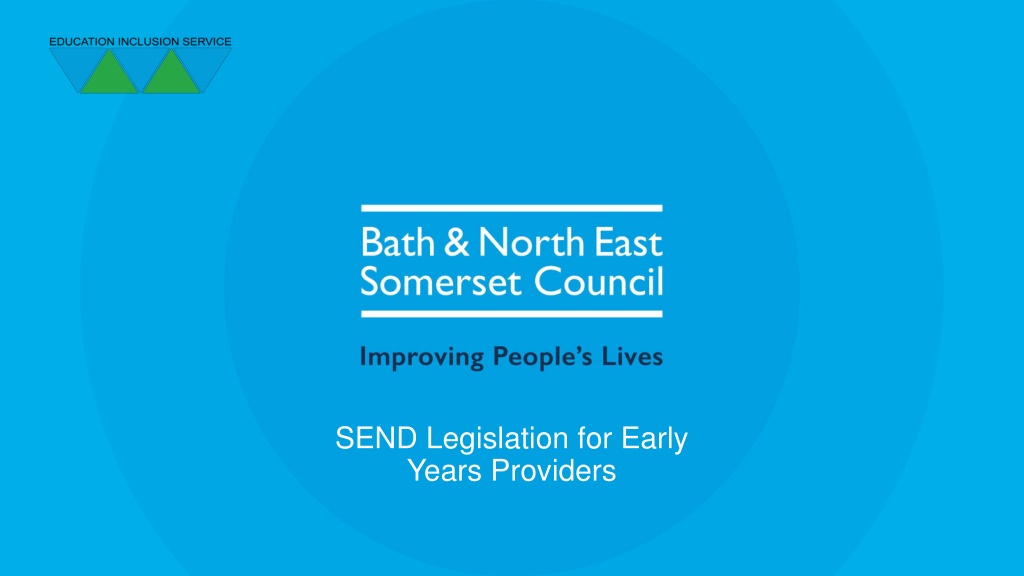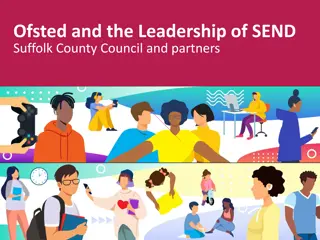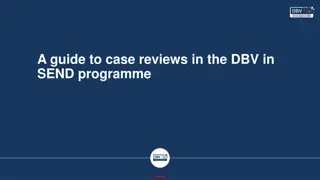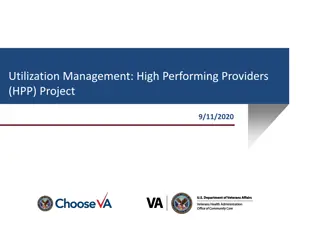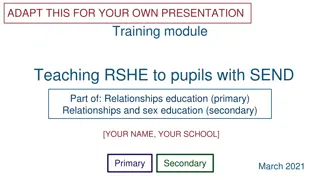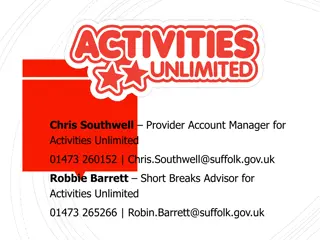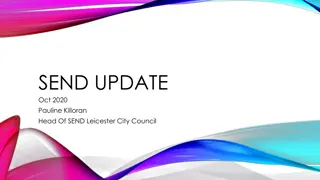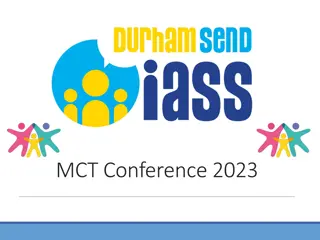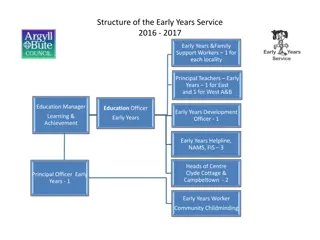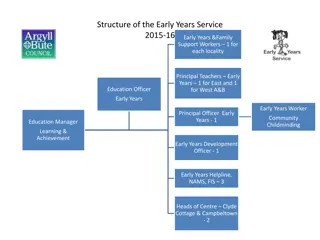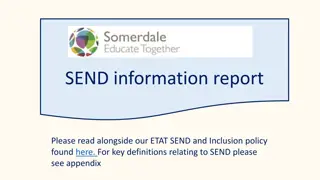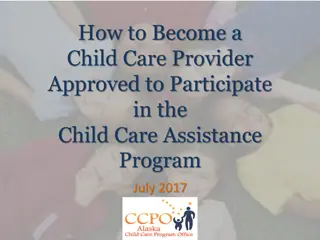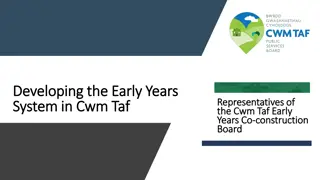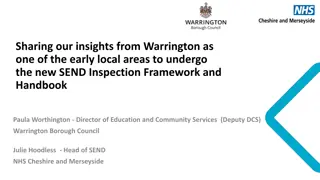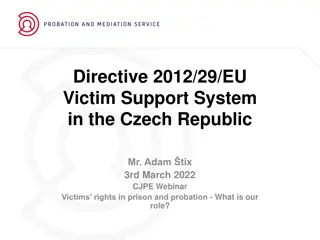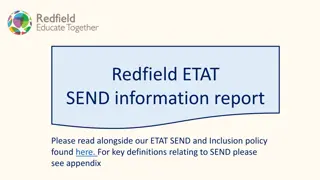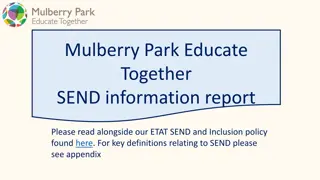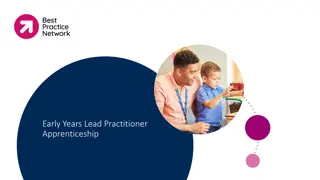Understanding SEND Legislation for Early Years Providers
The SEND Code of Practice 2015 outlines legal requirements and statutory guidance for early years providers, focusing on inclusive practices, removing barriers to learning, and providing high-quality provision for children with special educational needs and disabilities (SEND). It emphasizes the importance of identifying and supporting all children with SEND, increasing their participation, and giving them more choice and control over their support. This legislation sets out the actions that early years settings need to take to meet the needs of children and young people with SEND.
- SEND legislation
- Early Years Providers
- Code of Practice
- Special Educational Needs
- Disability Regulations
Download Presentation

Please find below an Image/Link to download the presentation.
The content on the website is provided AS IS for your information and personal use only. It may not be sold, licensed, or shared on other websites without obtaining consent from the author. Download presentation by click this link. If you encounter any issues during the download, it is possible that the publisher has removed the file from their server.
E N D
Presentation Transcript
SEND Legislation for Early Years Providers
How much do you already know about the different types of Legislation and Regulations? Have you heard of the SEND Code of Practice 2015? Do you know what statutory guidance means? What are the four broad areas of need? What is the Graduated Approach? What is the purpose of an EHC Plan? What are the protected characteristics from the Equality Act 2010? What do we mean by reasonable adjustments? Will Ofsted be inspecting SEND provision? What are the recent changes to the Early Years Framework in regards to SEND?
What is the SEND Code Of Practice 2015? Outlines legal requirements and statutory guidance for providers, as set out in the Children and Families Act 2014, the Equality Act 2010, and the Special Educational Needs and Disability Regulations 2014. In 2015 the code was updated with further information. What is statutory guidance? Statutory guidance sets out what schools and local authorities must do to comply with the law. You should follow the guidance unless you have a very good reason not to. There is some guidance that you must follow without exception.
In this Code of Practice, where the text uses the word must it refers to a statutory requirement under primary legislation, regulations or case law. Where the text uses the word should it means that the guidance contained in this Code must be considered and that those who must have regard to it will be expected to explain any departure from it. Contents to look closely at: Chapter 5 Early Years Providers Chapter 6 Page 97 Broad Areas of Need Chapter 9 Education, Health and Care needs assessments and plans. https://assets.publishing.service.go v.uk/government/uploads/system/u ploads/attachment_data/file/39881 5/SEND_Code_of_Practice_January _2015.pdf
SEND Code of Practice 2015 The focus of the SEND Code of Practice is on inclusive practice, removing barriers to learning and providing high quality provision to meet the needs of children and young people. It clearly lays out the actions early years settings need to take to identify and support all children with SEND. Part of this is an aim to increase the participation of children with SEND and their parents in decision making, giving them more choice and control over their support.
Defining SEND in the SEND Code of Practice 2015 Providers must have arrangements in place to support children with SEN or disabilities. These arrangements should include a clear approach to identifying and responding to SEN. Communication and Interaction The Four Broad Areas of Need Page 97 Cognition and Learning a child or young person has SEND if they have a learning difficulty or disability which calls for special educational provision to be made for them. Social, Emotional and Mental Health Special Educational Provision is provision that is additional to and different from that which is normally available to pupils or students of the same age Physical and Sensory
Expectations from the SEND Code of Practice Early years providers should know precisely where children and young people with SEN are in their learning and development. They should: ensure decisions are informed by the insights of parents and those of children and young people themselves have high ambitions and set stretching targets for them track their progress towards these goals keep under review the additional or different provision that is made for them promote positive outcomes in the wider areas of personal and social development, and ensure that the approaches used are based on the best possible evidence and are having the required impact on progress. The role of the SENCO involves: ensuring all practitioners in the setting understand their responsibilities to children with SEN and the setting s approach to identifying and meeting SEN advising and supporting colleagues ensuring parents are closely involved throughout and that their insights inform action taken by the setting, and liaising with professionals or agencies beyond the setting
Following the Graduated Approach from the SEND Code of Practice Assess All Early Years Child Care providers must continually monitor and support children to ensure that they develop and learn as appropriate, identifying any developmental issues, working with parents to address any identified problems, use their own best endeavours to support the child using their own resources and drawing in extra help if needed. Plan Do Review
Education, Health and Care Plans in the SEND Code of Practice - Chapter 9 Chapter 9 outlines: when a local authority must carry out an EHC needs assessment, including in response to a request who must be consulted and provide advice the statutory steps required by the process of EHC needs assessment and EHC plan development, including timescales how to write an EHC plan requesting a particular school, college or other institution requesting and agreeing Personal Budgets, including sources of funding finalising and maintaining an EHC plan transferring an EHC plan reviews and re-assessments of an EHC plan ceasing an EHC plan disclosing an EHC plan The majority of children and young people with SEN or disabilities will have their needs met within local mainstream early years settings, schools or colleges. Some children and young people may require an EHC needs assessment in order for the local authority to decide whether it is necessary for it to make provision in accordance with an EHC plan.
Reflection How often do you refer back to the SEND Code of Practice for guidance? Does everybody on your staff team know what it is? You should use the whole of the SEND Code of Practice to regularly reflect on your current practices. Further guidance available from the Early Years: Guide to the SEND Code of Practice https://assets.publishing.service.gov.uk/government/uploads/system/uploads/attachment_data/file/350685/Earl y_Years_Guide_to_SEND_Code_of_Practice_-_02Sept14.pdf
EYFS Statutory Framework 2023 every child is a unique child, who is constantly learning and can be resilient, capable, confident and self-assured children learn to be strong and independent through positive relationships children learn and develop well in enabling environments with teaching and support from adults, who respond to their individual interests and needs and help them to build their learning over time. Children benefit from a strong partnership between practitioners and parents and/or carers. importance of learning and development. Children develop and learn at different rates. The framework covers the education and care of all children in early years provision, including children with special educational needs and disabilities (SEND). https://assets.publishing.service.gov.uk/government/uploads/system/uploads/attachment_data/file/1170108/EYFS_fram ework_from_September_2023.pdf
What is the EYFS Framework 2023? The EYFS framework: sets the standards that all early years providers must meet to ensure that children learn and develop well ensures children are kept healthy and safe ensures that children have the knowledge and skills they need to start school
What changes have been made to the EYFS Framework 2023? 12 July 2023- Added new version of 'Statutory framework for the early years foundation stage' which applies from 4 September 2023. The following 3 changes will apply: the current statutory minimum staff:child ratios in England for 2- year-olds changes from 1:4 to 1:5; childminders can care for more than the specified maximum of three young children if they are caring for siblings of children they already care for, or if the childminder is caring for their own child; clarifying that 'adequate supervision' while children are eating means that children must be within sight and hearing of an adult.
EYFS Framework 2023 guidance on supporting children with SEND Progress Check at Age 2 When a child is aged between two and three, practitioners must review their progress, and provide parents and/or carers with a short written summary of their child s development in the prime areas. This progress check must identify the child s strengths, and any areas where the child s progress is less than expected. If there are significant emerging concerns, or an identified special educational need or disability, practitioners should develop a targeted plan to support the child s future learning and development involving parents and/or carers and other professionals (for example, the provider s Special Educational Needs Co-ordinator (SENCO) or health professionals) as appropriate. Providers must have arrangements in place to support children with SEN or disabilities. Maintained schools, maintained nursery schools and all providers who are funded by the local authority to deliver early education places must have regard to the Special Educational Needs Code of Practice. Maintained schools and maintained nursery schools must identify a member of staff to act as Special Educational Needs Co-ordinator (SENCO) and other providers (in group provision) are expected to identify a SENCO. Throughout the early years, if a child s progress in any prime area gives cause for concern, practitioners must discuss this with the child s parents and/or carers and agree how to support the child. Practitioners must consider whether a child may have a special educational need or disability which requires specialist support. They should link with, and help families to access, relevant services from other agencies as appropriate.
Reflection How do you currently assess children s development? Do you have a clear process for children s key person to raise concerns for children s development? How often do you meet with your parents/carers of children with SEND to discuss their progress and development?
The Equality Act 2010 The Equality Act 2010 legally protects people from discrimination in the workplace and in wider society. It replaced previous anti- discrimination laws with a single Act, making the law easier to understand and strengthening protection in some situations. It sets out the different ways in which it s unlawful to treat someone. Part 6- Education https://www.legislation.gov.uk/ukpga/2010/15/contents
The Equality Act 2010- Reasonable Adjustments Under the Equality Act, settings must make reasonable adjustments to ensure that children (and others) with disabilities are not put at a substantial disadvantage by any policies, practice or physical aspects of your setting. The reasonable adjustments duty includes three key requirements: 1. to make adjustments to any provision, criterion or practice 2. to make alterations to physical features 3. to provide auxiliary aids and services The reasonable adjustment duty is anticipatory it requires thought to be given in advance to what disabled children might require and what adjustments need to be made to prevent that disadvantage.
Legal Obligations from the Equality Act 2010 The Equality Act 2010 sets out the legal obligations that schools, early years providers, post-16 institutions, local authorities and others have towards disabled children and young people: They must not directly or indirectly discriminate against, harass or victimise disabled children and young people They must not discriminate for a reason arising in consequence of a child or young person s disability Public bodies, including further education institutions, local authorities, maintained schools, maintained nursery schools, academies and free schools are covered by the public sector equality duty and, when carrying out their functions, must have regard to the need to eliminate discrimination, promote equality of opportunity and foster good relations between disabled and nondisabled children and young people. Public bodies also have specific duties under the public sector equality duty and must publish information to demonstrate their compliance with this general duty and must prepare and publish objectives to achieve the core aims of the general duty. Objectives must be specific and measurable. The general duty also applies to bodies that are not public bodies but that carry out public functions. Such bodies include providers of relevant early years education, non-maintained special schools, independent specialist providers and others making provision that is funded from the public purse.
Reflection What would you consider to be a reasonable adjustment for a child with a communication and interaction delay? How can you develop your whole setting approach to supporting children with SEND?
Ofsted- Early Years Inspection Handbook 2023 https://www.gov.uk/government/publications/early-years-inspection-handbook-eif/early-years- inspection-handbook-for-ofsted-registered-provision-for-september-2023 The provider must demonstrate how they will: meet the learning and development requirements, if appropriate meet the safeguarding and welfare requirements develop and deliver the educational programmes, if appropriate identify children s starting points and ensure that children make progress in their learning through effective planning, observation and assessment, if appropriate safeguard children work in partnership with parents, carers and others offer an inclusive service evaluate their service and strive for continuous improvement
What are Ofsted looking for in reference to SEND? In the first telephone notification call from Ofsted, they would like to know any additional support and/or arrangements for children who need special educational provision, including responses to any emerging needs or difficulties. Inspectors will evaluate evidence of the impact of the curriculum, including on the most disadvantaged children. Disadvantaged children includes children with SEND. In group provision, the inspector must track a representative sample of 2 or more children across the inspection. The inspector should discuss with the provider what they intend the relevant children to learn and remember based on what those children know and can already do. The evidence collected must refer to: - the practitioner s knowledge of each child - the progress check for any children aged 2 - the impact of any early years pupil premium funding on the children s development - the quality of support for any children with SEND - the discussions held with each child s key person and how they decide what to teach - how well children are developing in the prime and specific areas of learning that help them to be ready for their next stage of education, including school - the reason why children may not receive their full entitlement to early education and the impact that has on them, particularly disadvantaged children, which includes children with SEND
Inspection Grade Descriptors 2023 Leadership and Management- Good- Leaders act with integrity to ensure that all children, particularly those with SEND, have full access to their entitlement to early education. Quality of Education- Outstanding- The impact of the curriculum on what children know, can remember and do is highly effective. Children demonstrate this through being deeply engaged in their work and play and sustaining high levels of concentration. Children, including those children from disadvantaged backgrounds, do well. Children with SEND achieve the best possible outcomes. Good- The provider has the same ambitions for almost all children. For children with particular needs, such as those with SEND, their curriculum is still ambitious and meets their needs.
Overall Effectiveness: the quality and standards of the early years provision Inspectors should take account of all the judgements made across the evaluation schedule. In particular, they should consider: the extent to which leaders and providers plan, design and implement the EYFS curriculum the extent to which the curriculum and care practices that the setting provides meet the needs of the range of children who attend, particularly children with SEND the progress children make in their learning and development relative to their starting points, and their readiness for the next stage of their education children s personal and emotional development, including whether they feel safe and are secure and happy whether the requirements for children s safeguarding and welfare have been fully met and there is a shared understanding of and responsibility for protecting children the effectiveness of leadership and management in evaluating practice and securing continuous development that improves children s education
Reflection Do you feel prepared to speak with Ofsted inspectors regarding your SEND provision and protocols?
GDPR General Data Protection Regulation (GDPR) came into effect in 2018. GDPR Principles: All data collected must be: 1. processed fairly, lawfully and in a transparent manner in relation to the data subject 2. collected for specified, explicit and legitimate purposes and not further processed for unrelated or incompatible other purposes 3. adequate, relevant and limited to what is necessary in relation to the purposes for which data is processed 4. accurate and up to date 5. kept in a form that permits identification of data subjects for no longer than is necessary for the purpose for which the data was collected 6. processed in a way that ensures appropriate security of the personal data including protection against unauthorised processing, accidental loss, destruction or damage using appropriate technical and organisational measures.
GDPR and Safeguarding Safeguarding Where there are concerns about a child being at risk due to possible neglect or abuse, Local Safeguarding Partners (LSPs) procedures advise that it is best practice in most circumstances to seek consent before making a child protection referral. If consent is withheld and the concern remains that a child may be at risk of significant harm, the referral should still be made. Practitioners should follow LSP safeguarding procedures at all times and this remains unchanged by GDPR. Processing safeguarding data lawfully The Data Protection Act 2018 supplements GDPR and includes a new category of child abuse data, defined as physical injuries (non-accidental), physical and emotional neglect, ill treatment and sexual abuse. The Act allows all organisations to process data for safeguarding purposes lawfully and without consent where necessary for the purposes of: protecting an individual from neglect or physical and emotional harm; or protecting the physical, mental or emotional wellbeing of an individual. This covers situations where a child may be at risk of significant harm due to neglect or abuse and also applies to referrals made to the local authority for any child considered to be a 'child in need'.
Reflection How are you storing information and data on your SEND children?
Things to consider This is a brief overview of the legislation and regulations which are necessary to understand to be able to fulfil your role as a SENCo. You will need to show your understanding of these regularly throughout your role and are expected to read fully through the documents that have been linked to these slides. It is best to review the documents annually for any updates. Once you have read and fully understand the legislations and regulations, you will need to think about how best to implement the key themes throughout your daily practice.
